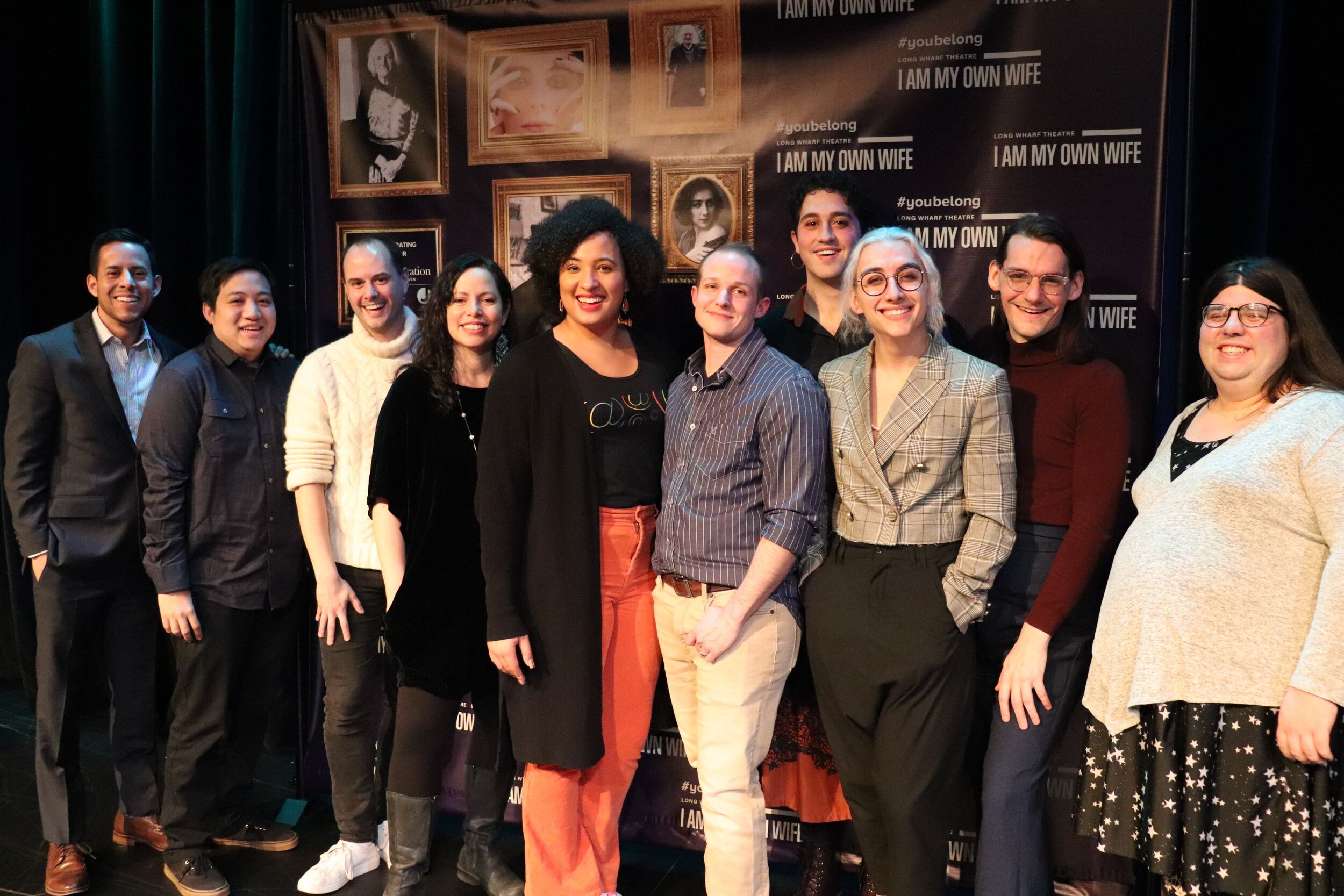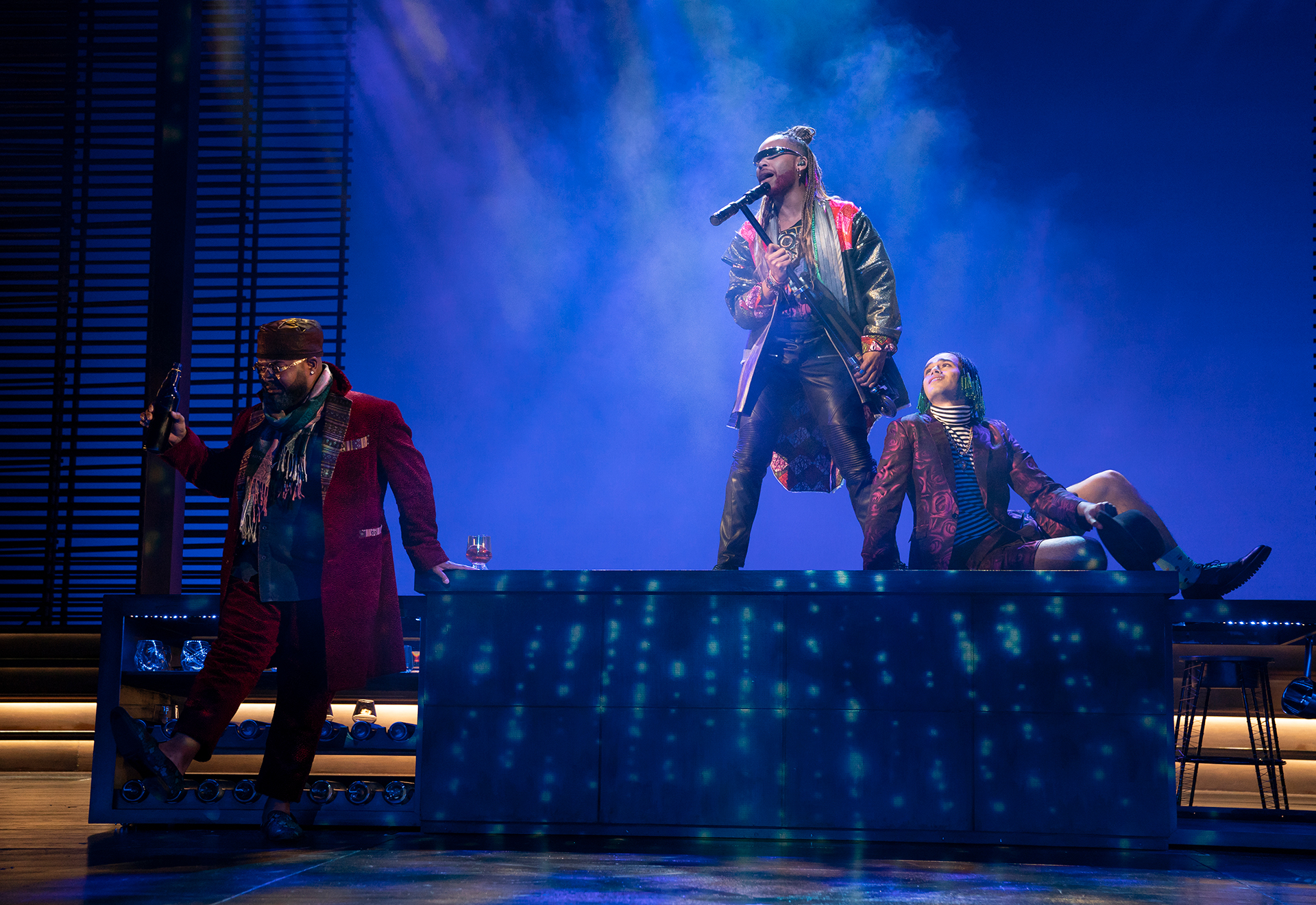Preview of I Am My Own Wife, Long Wharf Theatre
It was an unusual gathering on Long Wharf Theatre’s Stage II last Friday. Assembled to discuss Long Wharf’s production of Doug Wright’s I Am My Own Wife, which started previews this week and opens next Wednesday, was the entire creative team for the show, led in discussion by Patrick J. Dunn, Executive Director of New Haven Pride Center. In addition to Rebecca Martínez, the show’s director, and its star, Mason Alexander Park, the discussion included set designer Britton Mauk, costume designer Daniel Tyler Mathews, lighting designer Jennifer Fok, sound designer and original music composer Kimberly S. O’Loughlin, assistant director Kevin Paley, and cultural competency consultant Ianne Fields Stewart. It’s not typical by any means to meet the artists who undertake the technical feat of creating theater—most remain behind the scenes for a show’s entire run. What made the event even more unusual is the fact that Long Wharf has set a new standard by bringing together transgender artists to create the world of Wright’s Pulitzer-winning drama. The participants praised Long Wharf and its new artistic director Jacob G. Padrón for achieving a feat almost unprecedented: a play centering on a transgender person finds in this production an almost wholly nonbinary team.
And that’s significant because the version of the play at Long Wharf has been updated to reflect an awareness of trans persons lacking in the original version, which dates to 2003. The play incorporates aspects of the life of Charlotte von Mahlsdorf as revealed in her memoir, Ich bin meine eigene Frau, filtered through Wright’s interviews with Mahlsdorf and his sense of her life. Born Lothar Berfelde in Berlin-Mahlsdorf, Berfelde was imprisoned as a juvenile for the killing of his father, a Nazi who had threatened his son’s life. Released after the defeat of Nazi Germany, Berfelde became Charlotte von Mahlsdorf, residing in East Berlin throughout the era of Germany’s division and curating a museum of everyday objects. She died in 2002. The play, a one-person show, incorporates von Mahlsdorf into a story of Wright’s fascination with her life, in a script that features over thirty characters.
Jacob G. Padrón, Jennifer Fok, Patrick J. Dunn, Rebecca Martínez, Ianne Fields Stewart, Britton Mauk, Kevin Paley, Mason Alexander Park, Daniel Tyler Mathews, Kimberly S. O’Loughlin, at the Long Wharf Theatre, Stage II, January 31, 2020 (photo by Deena Nichol-Blifford)
The intention behind the changes to Wright’s play, undertaken with the author’s consent and encouragement, is to “to look carefully at how the show showcases Charlotte most positively” said Martinez. Park spoke of “two different plays”; in the original, Park said, there was a certain “sensationalism” in one actor—male—playing both male and female roles. In the new version, they said, the goal is a more faithful rendering of a “trans narrative,” to show “Charlotte’s journey and her truth.” Access to the extensive archival interviews with von Mahlsdorf led to “the discovery of Charlotte’s naughtiness,” sparking, the team hopes, “conversation around trans bodies and the sexual aspects of their lives.” Park spoke of how trans stories are “usually stories of tragedy,” and the new version of I Am My Own Wife seeks to replace a sense of “a challenging, dark life” with an experience of “an open, loving person.” The question of how a trans person lived—in Charlotte’s time—is certainly one of the fascinations of the play, and brought Wright to the topic, but the team at Long Wharf is determined that the show should speak of and to trans culture in the 21st century.
To that end, said Mathews, the costuming has become more colorful, drawing upon Charlotte’s tastes and tendencies and eschewing the black outfits adorned with pearls favored by the Broadway production that earned Jefferson Mays a Tony in 2004. There is also a collective effort to create, with sound and lighting and set design, the world of Charlotte, a collector, an antiquarian, a bon vivant, and, as Park said, “a person looking for love like anyone else.” O’Loughlin researched the recordings referenced in the script—von Mahlsburg was a collector of recordings—so that the music could be “integrated into transitions” which feature “both ‘found’ and composed” music. Fok spoke of lighting designs “inspired by the many location shifts” in the script and an effort to present “how Charlotte sees herself contrasted with how she is seen by others.” Mauk stressed that the new production positions Charlotte “not as an object to be gazed upon, but a story to be shared.”
There has been a sense for some time in the trans community that the play needed to be revisited and the Long Wharf production is pathbreaking in meeting that challenge. Some of the changes are shifts in how the story is told, others, Martínez said, are conscientious toward the vocabulary and attitudes of trans identity today. Paley spoke of the play as not a documentary of Charlotte’s life, but one in which her spirit will be more present than in earlier productions.
Stewart pointed out that it is “not the norm” by any means that “even in shows with queer themes” so many trans artists would be brought in. She spoke of how her role as cultural competency consultant often puts her in the position of having to explain matters that are obtuse to cisgender teams and casts. Here, that’s not the issue, and that’s “refreshing,” as “the erasure of queer bodies onstage” is more typical, in her experience. Wright’s play, in Stewart’s view, can start “uncomfortable conversations,” producing “essential theater that tells stories in ethical, honest ways.”
The team acknowledged that one such conversation that needs to take place is about “the dominance of white cis men” in all aspects of theater, particularly in the technical fields. While it may seem non-controversial to bring in trans artists for a show about trans persons, restricting the expert work of trans artists to such productions relegates them to a special interest aspect of theater. It will be interesting to see if Long Wharf’s production of I Am My Own Wife, which runs from February 5-March 1, will be, as Stewart hopes, “a step through a door that leads to other things.”
Dunn, Fok, Mathews, Stewart, Martínez, Park, Mauk, Paley, O’Loughlin, Long Wharf Theatre Stage II (photo by Deena Nichol-Blifford)
I Am My Own Wife
By Doug Wright
Directed by Rebecca Martínez
Long Wharf Theatre
February 5-March 1, 2020





